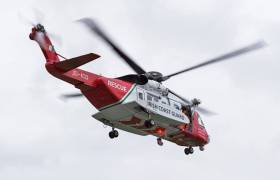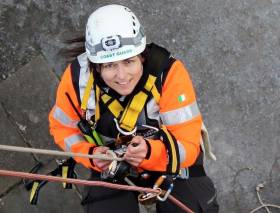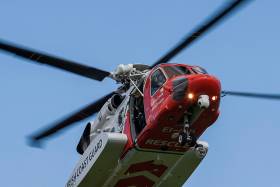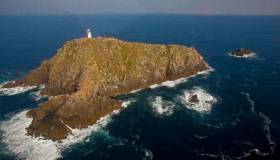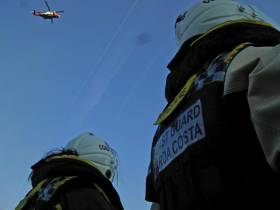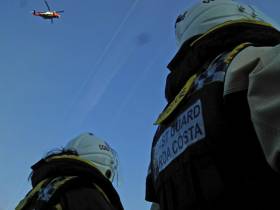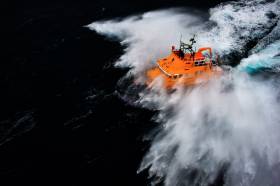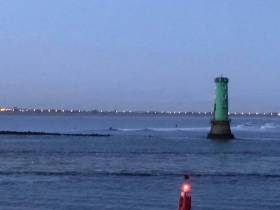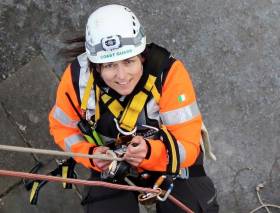Displaying items by tag: Irish Coast Guard
Stricken Trawler Found Off Kerry After Capsize Fears
#Rescue - A fishing trawler in distress off the Irish coast has been found after concerns that it had sunk, as the Irish Examiner reports.
Contact was lost with the 22m Ocean Pioneer after it was left without power some 150km off Kerry on Tuesday (27 March), and crew activated the vessel’s EPIRB emergency beacon to attract the attention of the coastguard.
The signal was picked up by the Irish Coast Guard, which dispatched the Shannon-based helicopter Rescue 115 to the trawler’s last known location.
Not long after, the fishing boat was found with its seven crew unharmed, but the Naval Service vessel LÉ William Butler Yeats was sent to guard the trawler overnight as it presented a risk to over vessels without its lights.
The Irish Examiner has more on the story HERE.
New Stamp Collection To Remember Lost Search & Rescue Personnel
#Coastguard - Next year’s commemorative stamp programme from An Post will feature a tribute to the four coastguard crew lost in the Rescue 116 tragedy one year ago.
RTÉ News reports that Caitriona Lucas, the coastguard volunteer who died during a rescue mission in September 2016, will be included as part of a series paying tribute to the work of the Irish Coast Guard.
Among other stamps due in 2019 will be one to mark 100 years since the first non-stop transatlantic flight from Newfoundland to Galway by British aviators Alcock and Brown.
Interim Statement On Rescue 116 Tragedy Calls For ‘Thorough Review’ Of Irish SAR Operations
#Rescue116 - The Air Accident Investigation Unit has called for “a thorough review of search and rescue aviation operations in Ireland” in the wake of the Rescue 116 tragedy one year ago.
Four Irish Coast Guard crew — Capt Dara Fitzpatrick, Capt Mark Duffy, winch operator Paul Ormsby and winchman Ciaran Smith — were lost when their Sikorsky S-92A helicopter went down at Black Rock island, off Blacksod in Co Mayo, in the early hours of 14 March 2017.
The AAIU confirmed in January that due to the “depth and breadth” of its investigation into the incident, a final report would not be completed within the first year, and progress would be detailed in an interim statement.
Published on Friday (16 March) days after commemorations in Mayo for the four Rescue 116 crew, this statement called on the Minister for Transport to conduct “a thorough review” of air-based SAR “to ensure that there are appropriate processes, resources and personnel in place to provide effective, continuous, comprehensive and independent oversight of all aspects of these operations.”
The statement also highlighted an issue with the “coarseness” of position data recorded by the helicopter’s flight data recorder, suggesting upgrades or modifications “to ensure that the latitude and longitude information recorded on the Flight Data Recorder reflects the most accurate position information available during all flight regimes and mission profiles.”
And it urged coastguard helicopter operator CHC Ireland to conduct an internal review of its safety management systems, or SMS, after the investigation raised “concerns regarding its efficacy”.
Interim safety recommendations included in last April’s preliminary report remain open, the AAIU says.
Minister for Transport Shane Ross welcomed the publication of the AAIU interim statement on Friday, and said he has asked his department to ensure that the recommended review of SAR aviation operations “is instigated without delay”.
“The aim of this review will be to ensure that our arrangements in this regard are sufficiently robust and measure up to international best practice models,” Minister Ross added.
Noting the length of the investigation, the minister said it was “important to emphasise” that the AAIU’s work remains in progress.
“Whilst I understand the ongoing public interest in this matter, it is vital that the AAIU is given the time and space to complete its work and report on its findings,” he said. “As such, I am not in position to comment further on the issues surrounding it.”
#Rescue116 - Today, Wednesday 14 March, marks one year since the Rescue 116 tragedy off Co Mayo.
Relatives of the four Irish Coast Guard crew lost in the crash attended a midnight vigil in Blacksod, as The Irish Times reports.
More than 100 people joined the local community in paying tribute to Capt Dara Fitzpatrick, Capt Mark Duffy, winch operator Paul Ormsby and winchman Ciaran Smith, the latter two of whom remain missing.
Events will continue today with a Mass in Tirraunt and the laying of wreaths by the Naval Service’s LÉ Niamh and Irish Lights vessel Granuaile. The Irish Times has more HERE.
Young Scientists Hopefuls Flag Coastguard Navigation Chart Errors In Helicopter Project
#Coastguard - Secondary school students taking part in this week’s BT Young Scientist & Technology Exhibition at the RSD have identified a list of errors in navigational charts used by the Irish Coast Guard’s helicopter crews.
As the Irish Independent reports, pupils from Pobalscoil Neasáin in Baldoyle, Co Dublin found that official air charts used by the coastguard had inaccurate locations for famous landmarks including Fastnet Rock and Skellig Michael.
At the same time as the Irish Aviation Authority appeals to SAR pilots to assist in making corrections to its latest charts, the second-year students flagged the mistakes in the course of their research for a prototype helicopter-mounted ultrasonic sensor.
The ‘EchoCopter’ would the terrain of the aircraft’s flight path in real time, providing supplementary data alongside the built-in EGPWS system.
It’s hoped that such a device might help avoid further tragedies such as the Rescue 116 crash last March, which took the lives of four experienced coastguard SAR crew.
The Irish Independent has more on the story HERE.
Irish Coast Guard Saved 335 Lives In 2017
#Coastguard - The Irish Coast Guard saved 335 lives and assisted more than 3,300 people in 2017, as RTÉ News reports.
Among the details of its end of year review, the coastguard said its volunteer units and helicopter SAR crews also assisted with recovering 65 bodies resulting from drownings or searches for missing persons.
Overall, rescue incidents handled through the coastguard’s three Marine Rescue Co-ordination Centres were marginally fewer than in 2016.
But the coastguard also noted that despite its own and others’ water safety messages, a sizeable number of those assisted in SAR incidents last year were not wearing a personal floatation device or lifejacket.
RTÉ News has more on story HERE.
SAR Pilots Asked To Help Correct Navigation Chart Revised After Rescue 116 Tragedy
#Rescue116 - The Irish Aviation Authority has appealed to SAR and other pilots to help correct its latest aeronautical chart introduced this past summer, as The Irish Times reports.
The updated visual flight rules chart was published in response to the Air Accident Investigation Unit (AAIU) highlighting issues with navigation data uncovered during their investigation of the Rescue 116 tragedy, which remains ongoing.
It’s now emerged that pilots have been encouraged to report mistakes and omissions in the new chart, which is already known to indicate a number of lighthouses in the wrong positions, among other errors.
In other news, the company that operates the Irish Coast Guard’s helicopter SAR services says its future profitability could be affected by potential legal and regulatory proceedings in the wake of the incident off Co Mayo in March this year.
The Irish Independent reports that CHC Ireland added the advisory to its latest accounts published for the Companies Registration Office.
#WaterSafety - The Irish Coast Guard and the RNLI have issued a joint safety message for the festive season to remind people to stay safe when they are in or near the water, and to remember some basic safety advice to use if they see someone in trouble or get into difficulty themselves.
Speaking ahead of the holiday period, Irish Coast Guard operations manager Gerard O’Flynn said: “Many people will be engaging in outdoor activities along the coastline. The simple safety message is: Stay Back, Stay High, Stay Dry.
“Christmas Day swims are a popular pursuit and we would urge the public to only participate in organised swims where medical support and lifeguards are available.
The three Rescue Co-ordination Centres based in Malin, Valentia and Dublin, along with the coastguard helicopter service and volunteer units, will remain operational over the holiday period.
“And we would remind the public that if you see anybody in danger at sea, on the coast or on cliffs to call 112 and ask for the coastguard,” O’Flynn added.
The RNLI’s volunteer lifeboat crews will also remain on call over the Christmas period “but what would really make them happy is if everyone has a safe Christmas,” said the RNLI’s head of engagement Gareth Morrison.
“At this time of year a lot of people take part in charity swims and the water temperature is a lot lower than in the summer months. The RNLI lifeboat crews launch to a lot of people who never expected to end up in the water when they left the house. Callouts can be to people getting cut off from the tide, to slips or falls while walking near the coastline.
“We run our drowning prevention campaign ‘Respect the Water’ all year round and ask people to follow some simple advice and know what to do in an emergency. Further information is also available at www.respecthewater.com.”
If you fall into cold water unexpectedly, remember to fight your instincts, not the water.
People follow the same instinct when in cold water - they gasp, thrash about and swim hard. But this increases chances of water entering your lungs and increases strain on your heart.
If this happens, fight your instinct and float. The initial shock will pass quite quickly within 60–90 seconds and when you have regained control of your breathing, you can then try swimming to safety or calling for help. You’ll have a far better chance of staying alive.
If taking part in a swim, always take your time to slowly walk into the sea to allow your body time to acclimatise. Stay in the shallow water when you first go in to reduce the severity of cold water shock.
If you see someone in trouble in the water, fight the instinct to go in yourself. Call 999 or 112 and ask for the coastguard.
If out for a walk by the water or along the coast, remember:
- Be wary of all edges around the sea and waterside. Slips and falls happen in all locations; it is not just high cliff edges that are a risk.
- Always let someone know where you are going and when you expect to be back.
- Take care when walking in dark and slippery conditions.
- Always take a means of calling for help.
- Always check the weather and tides.
Dun Laoghaire Coast Guard In Callout To Paddle Boarders At Bull Wall
#Coastguard - The Irish Coast Guard received a call from a member of the public yesterday evening (Sunday 5 November) who advised that two stand-up paddle boarders appeared to be in difficultly at the North Bull Wall near Dublin Port.
Dun Laoghaire Coast Guard’s team was on patrol off Sandymount at the time and were tasked to investigate, first making contact with the concerned caller.
Due to fading daylight, it was difficult to assess the SUPs’ situation and the coastguard crew had to relocate to a better position.
Assistance was also requested by incoming ferries to investigate on their passage into Dublin Port if the SUPs were indeed in difficultly.
It was quickly determined that the SUPs were riding the wake from the ferries, and eventually returned to shore once the ferries had passed.
The paddlers were part of a group that travels out daily to meet the ferries, taking off from the north side of the North Wall and staying outside of the shipping channel. All have undergone safety training and have been an asset to emergency responders at times, said Dun Laoghaire Coast Guard.
However, to some out walking in the evening, they might appear to be making no progress and this may prompt concern.
“Thankfully a safe ending to a cold evening,” said the coastguard unit.
Protest In Kilkee Over Reduced Coastal Rescue Service
#Coastguard - Irish Coast Guard management faced a protest march at the weekend over Kilkee’s lack of a full rescue service — and one restricted further since the death last year of coastguard volunteer Caitriona Lucas, as The Irish Times reports.
Locals were demonstrating for the second time this month over what former mayor Manuel di Lucia said was an issue that dated back to when the Irish Coast Guard took over the Co Clare’s town’s community lifeboat in 2013.
The paper’s sources allege inconsistent management and a lack of training and qualified crew compounded the situation that led to the death of Lucas, when the RIB she was travelling in capsized during a search operation. Her bravery at sea was recognised with a posthumous award of the State's highest honour earlier this month.
The Irish Times has much more on the protest, which came on the same weekend that Lucas and the lost crew of Rescue 116 were remembered at a memorial service for those who died in the Cleggan Bay Disaster in 1927.


























